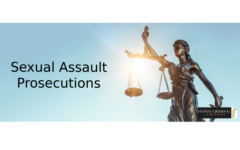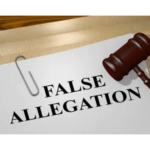Judge’s Complaint Against DPP Highlights the Injustice of Prosecuting Meritless Sexual Assault Claims

New South Wales District Court Judge Penelope Wass has made a formal complaint to the Legal Services Commissioner against the state’s chief prosecuting lawyer, Director of Public Prosecutions, Sally Dowling SC, after Ms Dowling allegedly raised ‘secret grievances’ about Judge Wass to the Court’s Chief Judge, Sarah Huggett, in the middle of a sexual assault trial being presided over by Judge Wass.
Prosecuting meritless sexual assault claims
Judge Wass made the complaint amid controversy that has been brewing for some time with a number of judges, criminal defence lawyers and indeed prosecution lawyers expressing frustration regarding the Office of the Director of Public Prosecutions’ (ODPP) practise of taking sexual assault allegations to trial despite a lack of credible evidence to support – a course of action that is against the ODPP’s own guidelines which make clear a criminal prosecutions are to be discontinued where if there is insufficient admissible evidence to support the claims.
Judge discloses complaint
Judge Wass disclosed her complaint while presiding in Taree District Court on Tuesday, 2 July 2024, advising parties she was doing so in order to allow them the opportunity to consider whether to make an application for her to recuse herself from any matters before her; in other words, step aside and allow another Judge to deal with them
Advancing the interests of sexual assault complainants at the expense of the truth
It has been reported that last month, Ms Dowling made a complaint about Judge Wass during a sexual assault prosecution because the Judge had directed witnesses to present their phones as evidence with a view, of course, to ascertain the credibility of their evidence and arrive at the truth.
The Chief Prosecutor is reported to have made the extraordinary assertion that the direction somehow jeopardised the right to a fair trial.
The situation is not just a dispute between two professionals in the criminal justice system – but raises concerns about how far the DPP will go to secure a conviction, at the expense of the truth.
Ms Dowling SC’s ‘grievances’ are reported to have been made despite all of the armory handed to prosecutors in recent times to make it easier to convict those accused of sexual offences – from recently implemented affirmative consent laws to newly formulated judicial directions in sexual assault trials, which many see as essentially requiring judges to urge jurors to convict despite misgivings jurors may have about the complainant’s claims.
It has come to a point where the ODPP is being seen by many as knowingly or at least recklessly taking sexual assault cases to trial where the credibility of the complainant and veracity of the claims is undermined to such an extent when the evidence is viewed in totality that there is little prospect of conviction, despite all of the said factors that weigh in the prosecution’s favour.
This perception is a serious one, given the role of prosecutors in New South Wales is not to secure a conviction at all costs but to independently assess the available material and, where it is in the public interest to pursue a prosecution, to serve that material on the defence in a timely manner (something it has regularly been accused of failing to do) and present the evidence in court in a fair and balanced way with a view to achieving a just outcome – whether that be a conviction or acquittal.
If the perception is indeed accurate, the situation is wasting public funds, putting pressure on the court system and unnecessarily dragging innocent people through the ordeal of a trial, with all the associated mental and financial impact on them and their loved-ones.
Prosecutions Guidelines in New South Wales
The DPP is bound by Prosecution Guidelines which are issued under section 13(1) of the Director of Public Prosecutions Act 1986, These guidelines set out the general principles for the initiation and conduct of criminal prosecutions.
There are many factors which go into determining whether or not the DPP will prosecute a case. These include, but are not limited to considerations such as the seriousness of the offence, the prevalence of the offence in the community, the accused person’s degree of culpability, criminal history and background, and whether the offence occurred while the accused person was serving a sentence, on bail or remand. The DPP will also regard the viability of building a prosecution around the facts and evidence available.
The complainant’s attitude towards prosecution, and the impact that prosecution may have are also taken into account. Above all, the DPP has a duty to ensure that those who are guilty are brought to justice, and those who are not, are not wrongly convicted.
The DPP also has a responsibility to consider the considerable publicly funded expenses of criminal trials, along with the time members of the community devote to jury service.
Meritless trials can not only have a devastating effect on those who have been falsely accused, they also impact the justice system by creating unnecessary delays and backlogs on a system that has long been over-burdened, and is still suffering the impact of Covid-19 when jury trials were suspended for some months.
Audit of sexual assault cases committed to trial
The criticism levelled at the New South Wales DPP in recent months has led to the announcement that an audit will be conducted of hundreds of cases, between 300 – 400 which have been committed to trial this year.
Ms Dowling has indicated that the audit will include all sexual assault matters where the complainant is over the age of 16, and able to legally consent to sexual activity.
The cases will be reviewed by Crown Prosecutors who are not local to where the case has been listed, to ensure no conflicts of interest arise. The audit is not meant to be a ‘witch hunt’ looking for failures in individual practices, but will consider the nature of prosecutions as a whole.







